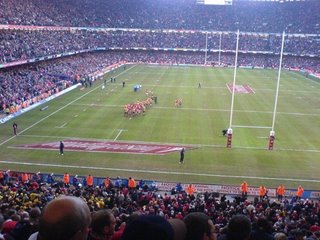Monday, November 27, 2006
Thursday, November 23, 2006
Sarah Radford
Sarah Radford was a 2004 graduate on the newspaper diploma course and is an award-winning online journalist for the Newbury Weekly News. Sarah gave a fascinating presentation on the swift developments which have occurred since the website was launched in May 2005.
The Berkshire weekly, founded in 1867, was the first local paper to utilise video stories. As well as this, the Newspaper Society's "Best Weekly Newspaper Internet Site", produce six news stories a day, sport and entertainment. The future plan is to capture a younger audience. A second version of the website in 2006 brought this intention much closer to reality when the paper introduced a lifestyle section and picture galleries.
Today, numerous media companies are looking to re-evaluate their news provisions. The worry among local papers is the lack of young people contributing to their paper. The readership has declined by 1% in the last year and with the next generation seemingly uninterested in papers, a fresh approach is required.
The website VG in Norway uses a successful model of merging web and print journalism together. According to the paper's managing director, Adrian Martin: "This is the way forward."
A website offers updated news and interaction, a major advantage over a paper in a world thirsty for instant communication. Consider the example of the London bombings: Newbury Weekly News is situated in London's commuter belt so although the story was huge on a world scale, it also created a massive local interest. The website could move quickly within hours whereas people in the area would have to wait for the following week's newspaper edition. Furthermore, using a video online can take a story much further than a picture.
As each week passes, it's clear to me that multi-skilled journalists are the future and Sarah supported this by saying everyone in the industry wants to do the same thing. Martin Robertshaw, the website manager, said "If people come to a job interview and are multi-skilled, it will be a happy day."
I must remember to take my camera everywhere then...
Feature Idea
 Last week, Yahoo announced a deal to work in partnership with seven newspaper groups in the USA, covering 176 newspapers.
Last week, Yahoo announced a deal to work in partnership with seven newspaper groups in the USA, covering 176 newspapers. For my feature idea, I am going to look at how search engine partnerships such as this would have an effect if this occurred in Europe? Could this happen to local newspaper groups in England? The Yahoo group are looking towards advertisement and content for the time being but where will this eventually lead? Crucially, large companies are looking for expertise in local community papers. The BBC are already on the case with their increased involvement in "Where I Live." How will local papers react?
I hope to speak to journalists in local newspaper groups such as Sarah Radford of the Newbury Weekly News to ask her thoughts on what they could offer the big companies. I would also like to speak to local newspaper editors to see what they think of this business model approach, which is in contrast to Rupert Murdoch's acquisition of MySpace.
Tuesday, November 21, 2006
Riverside Warehouse Project
 Last Friday, the Restart Riverside Warehouse project were victorious on the ITV News programme, People's Millions. Over 350,000 people across the UK voted as the new youth centre on Machen Place beat off competition from Johnston's Institute near Haverfordwest. The Warehouse has been given a £50,000 Big Lottery Grant and will be open in the spring.
Last Friday, the Restart Riverside Warehouse project were victorious on the ITV News programme, People's Millions. Over 350,000 people across the UK voted as the new youth centre on Machen Place beat off competition from Johnston's Institute near Haverfordwest. The Warehouse has been given a £50,000 Big Lottery Grant and will be open in the spring.For more information on the success, click here
The Ashes
 We've waited months for this (well, just me then!) Get ready for some long nights glued to the box, plenty of coffee (lager on weekends) and hopefully a series to rival the last one in 2005 when the Ashes finally came home.
We've waited months for this (well, just me then!) Get ready for some long nights glued to the box, plenty of coffee (lager on weekends) and hopefully a series to rival the last one in 2005 when the Ashes finally came home. Having travelled in Australia during the early part of this summer, I know for a fact, the Aussie's in Brisbane, Adelaide, Perth, Melbourne and Sydney will be extremely pumped up for this. Yet, so will England. Watching the re-run's on sky recently, the last series brought great rivalry and sportmanship, commentatary from channel 4 (over to you, sky), support, drama and most of all, moments.
Having travelled in Australia during the early part of this summer, I know for a fact, the Aussie's in Brisbane, Adelaide, Perth, Melbourne and Sydney will be extremely pumped up for this. Yet, so will England. Watching the re-run's on sky recently, the last series brought great rivalry and sportmanship, commentatary from channel 4 (over to you, sky), support, drama and most of all, moments.McGrath's five-for at Lord's, The Best Test Match ever at Edgbaston, Vaughan and Ponting's centuries at Old Trafford, Strauss' catch at Trent Bridge and KP's masterclass at the Oval to seal the series are all etched in cricket folklore. And that's not to mention the brilliance of Flintoff and Warne!
 Sure, both teams have slightly changed since then with Australia creeking with age but, positively, welcoming into their party Mike Hussey and left-arm seamer Mitchell Johnson. Admittedly, England have been deprived of key players like Vaughan, Trescothick and Jones through injury and illness but it's time for the new stars to step forward in Ally Cook and Monty.
Sure, both teams have slightly changed since then with Australia creeking with age but, positively, welcoming into their party Mike Hussey and left-arm seamer Mitchell Johnson. Admittedly, England have been deprived of key players like Vaughan, Trescothick and Jones through injury and illness but it's time for the new stars to step forward in Ally Cook and Monty. A couple of mates and I went to the multi-coloured 40,000 seated venue where the first ball will be bowled in Brisbane
 and i, for one, can be sure the Gabba will be one hell of an intimating arena come midnight on Wednesday.
and i, for one, can be sure the Gabba will be one hell of an intimating arena come midnight on Wednesday.
Monday, November 20, 2006
Cardiff Blues v Connacht
 I went to the Cardiff Blues rugby match on Saturday to help out with their media staff. Feeling the effects of Friday night, an awful encounter on a freezing afternoon wasn't what I had in mind, so, I was glad of the banter provided by Sarah and Helen (thanks girls!)
I went to the Cardiff Blues rugby match on Saturday to help out with their media staff. Feeling the effects of Friday night, an awful encounter on a freezing afternoon wasn't what I had in mind, so, I was glad of the banter provided by Sarah and Helen (thanks girls!)Here's a quick piece on what we witnessed on the pitch.
Man of the match Ben Blair scored five penalties to secure a narrow victory for the Blues at the Arms Park . The Kiwi full back came up trumps with five successful kicks out of six to steal the points in what was a scrappy affair to register the Blues’ fourth win of their Magner's League campaign.
A minute's silence was observed before kick off in honour of Welsh Rugby Union President Keith Rowlands - an ex-Cardiff player and administrator - who died on Saturday at the age of 70.
It seemed to have a negative effect on the Blues fifteen as they struggled to clear their lines after Connacht's switched kick off. The first minute brought the only try of the match after the Irishmen recycled quick ball to allow ex-Newport wing Matt Mostyn to burst through the midfield defence to score near the posts. Mostyn was injured in scoring the try and was replaced by Conor McPhillips. Fly-half Paul Warwick added the conversion.
Connacht dominated possession for the rest of the half and should have extended their lead when Warwick sent a clever cross kick to McPhillips but the ever-increasing wet conditions defeated the right winger in the corner. Blair kept the Blues in touch by kicking three penalties. Warwick added a further two penalties to see his team go into half time with a slender 13-9 advantage.
Led by captain Xavier Rush, Cardiff showed more urgency in the second period but this was a match littered with sporadic pieces of quality. Nicky Robinson maintained the pressure with several up’n’unders which Connacht fullback Dan O’Riordan hesitantly dealt with. Blair calmly kicked a penalty midway through the half and the Blues fight back was complete when Blair scored again on 69 minutes to put the Blues into the lead for the first time in the match.
Thursday, November 16, 2006
*Lazy journalism?
 Pete Clifton, head of BBC News Interactive, gave us an interesting lecture and somewhat altered my opinion on User Generated Content (UGC). Previously, I've stated I'm not a huge fan of UGC, but, when Pete spoke about July 7th in London, I nodded along in agreement. I believe when big-scale incidents such as this happen so quickly, you should utilise any source which will benefit the output.
Pete Clifton, head of BBC News Interactive, gave us an interesting lecture and somewhat altered my opinion on User Generated Content (UGC). Previously, I've stated I'm not a huge fan of UGC, but, when Pete spoke about July 7th in London, I nodded along in agreement. I believe when big-scale incidents such as this happen so quickly, you should utilise any source which will benefit the output. It begs the question, is this "lazy journalism?" Possibly, but in a world of fierce competition, you can't wait for a rival to be a step ahead of the game. On the other hand, I do believe UGC will create huge problems for journalists dealing with the accuracy and creditably of the content.
In the newsroom, the first impressions and thoughts among BBC journalists was that London had experienced a power surge. However, very quickly, through the help of the public, the first iconic image of the scene arrived and the BBC reassessed their views immediately. Pete said they were able to share the picture instantly with BBC News 24 and have a focal point for the audience to digest. Quality coverage which embraces with what the public wants.
Pete said UGC has raised the profile and reputation of the BBC and is only likely to get bigger and better. His vision is to make more of UGC on News 24, BBC World and interactive tv. For example, over 1,000 pictures were sent in by the public on the day of the London bombings but less than 5% of the content is used.
The BBC have set up a specialist authentication hub and have on file a database of content for BBC 5 Live, the website and BBC breakfast programme. This shows the impact and the change UGC has already enforced on the media, even at the highest level. Pete said: "User Generated Content is a fantastically useful route." However, does Pete say this as an employer of the BBC who are looking to exploit this market or does he genuinely believe this as a journalist?
Wednesday, November 15, 2006
Riverside
 Living just inside the Canton postcode boundary, I couldn't have really asked for a much closer ward. With HQ set up, I've been pottering around my ward for the past couple of weeks with my sidekick Davies, when we've not been watching sky sports news...
Living just inside the Canton postcode boundary, I couldn't have really asked for a much closer ward. With HQ set up, I've been pottering around my ward for the past couple of weeks with my sidekick Davies, when we've not been watching sky sports news...Riverside, encompassing the media village of Pontcanna too, brings many communities from around the world together. A diverse, western, inner-city ward with 41 languages spoken, it is unsurprising that Riverside is one of the most multi-cultural areas in Wales. As Riverside is one of the most deprived areas in Europe, I'm sure the area will produce many news worthy stories throughout the year.
I'll keep you posted...
Monday, November 13, 2006
Daniel Meadows
 Daniel Meadows, a lecturer here at JOMEC but also a digital storyteller on Capture Wales, set up in 2000, said journalists of today need to use the skills of other people. User Generated Content is on the increase and this series of digital stories gives the average Dave on Queen Street a voice. Apparently, we need to embrace it because we are in a digital era. I'm to be convinced.
Daniel Meadows, a lecturer here at JOMEC but also a digital storyteller on Capture Wales, set up in 2000, said journalists of today need to use the skills of other people. User Generated Content is on the increase and this series of digital stories gives the average Dave on Queen Street a voice. Apparently, we need to embrace it because we are in a digital era. I'm to be convinced. The BBC receives 10 million emails from newsers (basically, a blending of news users). But why should we take so much notice of UGC? Because the content comes from people's individual real life experiences.
I watched the unusual presentation of endless videos sent in by Welsh people and although, some of them were interesting and touching, in all honesty, I found the whole episode to be disrespectful to our profession.
For the last couple of weeks, I keep hearing the same party line being rolled out: "We should not be so narrow-minded and it is exciting times in the media."
Personally, I am interested in other areas of journalism and for example, would like to properly know how to work a camera but I do not want to fall into the trap of becoming a future Phil Neville of the journalism world, a jack of all trades but a master of none, thank you.
Richard Burton
 The latest guest appearance to the Bute Building came from Richard Burton, a print journalist spanning decades and former Editor of the Telegraph online, www.telegraph.co.uk until Europe’s first web-paper had their well publicised makeover during the summer.
The latest guest appearance to the Bute Building came from Richard Burton, a print journalist spanning decades and former Editor of the Telegraph online, www.telegraph.co.uk until Europe’s first web-paper had their well publicised makeover during the summer. Mr Burton's presentation was interesting, well delivered and raised three intriguing points. Firstly, online readers are "fickle cats" and do not possess brand loyalty whereas print readers are like "dogs" and display loyalty. Secondly, a blog is an insight of lives which are more interesting than ours. Mr Burton chose the example of D-list celebrity Chantelle from Big Brother. Finally, new media means new ideas and as times change, we have to adjust.
Crucially, and reassuringly, Mr Burton believes good, old fashioned journalistic skills are still the main requirement in the recruitment process today.
What impressed me most was Richard’s kind intimate afternoon session with us hacks in the newsroom. Despite all the doom and gloom I’ve heard for weeks on end about newspapers are a dying breed, I finally felt the choice I have made of wanting to be a print journalist immediately reignited. Richard's enthusiasm engulfed the room, his knowledge unquestionable and his anecdotes were funny yet importantly meaningful.
I scribbled down the important factors he would look for in a budding journalist at a job interview.
You need to have a driving licence, be smart, focused, respect and the biggest ingredient of all: Endeavour.
This sort of specialist talk is more of what I’d like to hear. It was a pleasure to listen to someone in our field with such vast experience. Respect to Mr Burton.
Wednesday, November 08, 2006
Wales v Australia

A capacity crowd of 74,000 fans packed into the Millennium Stadium for the first autumn international of the season. The passion from both sets of supporters was a sight to behold, the red of Wales mixed beautifully with the bright yellow of Australia under glorious overhead conditions.
2.25pm. Anthem-time and the lovely Katherine Jenkins did not disappoint with a heart-warming version of “Hen Wlad Fy Nhadau”. A great moment which certainly left the hairs on the back of my neck standing.

The atmosphere was brilliant throughout with no trouble or segregation lines on the terraces to be seen. What a contrast to football! My mate and I had a proud old Welsh couple from the Valleys to the left and an Australian couple from Brisbane, over for the tour to the right. With the score-line fluctuating, the banter and beers flowed and an enjoyable day out was had by all.
The rugby itself saw Australia capitalise early doors on a slow Welsh start. Captain and fly-half Stephen Jones’ knee injury saw Osprey’s James Hook take to the field. Here, an international player was born as he kicked 13 points and easily won the man of the match award.
Strangely, it was the first time I have ever seen a live rugby match finish in a draw. By all accounts, the result was fair albeit, when debatable decision-maker Steve Walsh from New Zealand blew the final whistle, it felt like such an anti-climax!
To see the match report: http://news.bbc.co.uk/sport1/hi/rugby_union/6112812.stm
Wednesday, November 01, 2006
Design and writing
Online users follow three principle criteria. i) Can they find what they want? ii) Can they view (by reading, hearing or seeing) the content when they find it? iii) Does the user have a satisfactory experience?
Design is a fundamental tool of online work. Credibility is important for web users with professionalism such as few mistakes and good English seen as standard. Navigation is key along with images and graphics and combined help a user to understand what is crucial to have on a page layout. Apparently, this can shape the total experience for a user.


